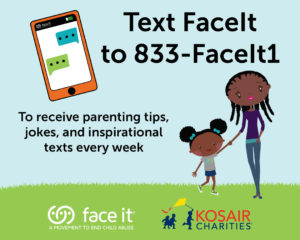Help Kids and Families as a Youth Program Professional
-Make sure your program requires criminal background checks, personal interviews, and professional recommendations for all adults
who work with youth.
-Assess your organization for risk of child sexual abuse with Darkness 2 Light. Reduce or prevent isolated, one-on-one situations between youth and adults to help reduce the risk of sexual abuse.
In Your Community
-Get out into your community and participate in local events hosted by organizations who provide services you support. This allows you to get to know your community members and build relationships with your neighbors.
-Volunteer with a Face It partner.
-Interested in advocating for change in state laws or regulations? Check out the Face It policy agenda.




